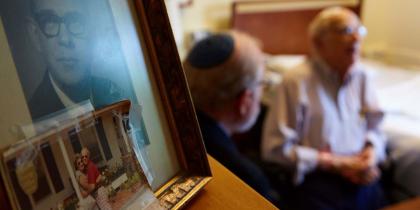Navigating Caregiver Grief: A Compassionate Guide
Understand the range of emotions that comes with caregiver grief and how to move forward after loss.

In the United States, over 53 million people are caregivers to adults and children with chronic health conditions or disabilities. This number, which represents one in five Americans, will only continue to grow as the country’s population ages and more older adults require assistance to maintain their quality of life.
Family caregivers take on their roles for various reasons. Many people want their loved ones to be able to live at home for as long as they can, but home care services aren’t within reach due to high out-of-pocket costs.
Caregivers often set their own lives aside — sometimes for years — dedicating their days to caring for a loved one, cooking, tracking medications, juggling appointments, and more. When that loved one dies, it’s normal to be consumed by a range of emotions. You may be facing a question that feels difficult to answer: “What now?”
Understanding grief after caregiving
Not all grief comes after death. A lot of caregivers experience anticipatory grief while their loved one is still with them.
When you do lose them, it’s normal to experience many different emotions: shock, helplessness, anger, guilt, denial, sadness, and even relief. The list goes on, and everyone experiences grief differently.
Caregivers are in a position that can make grief even more complicated than it already is. Caregiving is often all-consuming physically and emotionally, leaving you to redefine your life after your caregiving chapter comes to an end.
Grief in dementia caregivers
Caregivers of people with dementia face unique challenges. It’s common to witness distressing behavioral and personality changes as your loved one’s disease progresses. You may see them exhibit behaviors such as:
- Hoarding objects or items
- Sundowning, or exhibiting behavioral changes in the late afternoon and evening
- Becoming agitated, angry, depressed, or confused
- Displaying new or unusual sexual behavior
- Not recognizing or remembering you
- Asking the same question repeatedly
- Not maintaining good hygiene
- Wandering out of the house and becoming lost
Those changes can cause you to grieve the person they used to be or the closeness you once had. You may also experience anticipatory grief before they’re truly gone.
Permit yourself to grieve fully
Grief is personal. No two grief journeys or circumstances look exactly alike. You may have been taking care of an aging parent who you were immensely close with. You may have been taking care of a parent who you had a conflicted or tense relationship with, adding a layer of complexity to your grief now that they’re gone. Perhaps you were a caregiver for your spouse, and now you have to grieve while learning to navigate life on your own. Your relationship with your loved one, family dynamics, life experiences and philosophies, belief systems, and more will all play a role in how you perceive and cope with your loss.
Grief isn’t linear. You’re likely to feel sadness, numbness, and shock. You may already expect that. But you could also feel unexpected emotions, like anger or frustration. Maybe you feel upset that family members who you didn’t feel supported by as a caregiver have now shown up to voice their opinions about end-of-life decisions.
You may even feel a sense of relief or happiness that your loved one isn’t suffering or in pain anymore or that you have more time to take care of yourself. You may feel guilty that you have those positive emotions. Know that you shouldn’t — they’re normal, valid, and okay.
Grief isn’t easy to go through, but pushing your feelings aside tends to result in them coming out in other ways. You can’t push them down forever. By allowing yourself to experience your emotions fully and authentically, you can work toward a place of healing.
What if your grief doesn’t go away?
When you first lose someone, it’s expected for you not to be able to function very well. You may feel like you’re living in a fog. While working through your grief doesn’t mean you stop missing or aching for your loved one’s presence, it does mean you can eventually get to a point of integrating back into your life.
But a small proportion of caregivers — about 6-8%, according to research — experience something called complicated grief or prolonged grief disorder. Complicated grief is a lingering and intense form of grief that interferes with your daily life. If it’s been a long time since you lost your loved one and you’re struggling to function in your everyday life, seeking additional support from a bereavement counselor could be a good idea. It’s worth noting that bereavement counselors are a good idea for anyone who experiences grief, not just those who feel like something more serious is going on!
Working through grief and regaining a sense of purpose
In the earliest stages of grief, you may not feel ready to re-integrate into life — that’s completely normal. Just like with the range of emotions you may feel, how you regain your sense of purpose is a deeply personal experience that doesn’t look the same for any two people. But there are some things you can consider doing if you’re not sure where to begin.
Take care of yourself
Self-care can be a valuable component of your grief journey. Journaling, lighting candles, meditation, or being in nature can all be healing after losing somebody. If you’ve neglected your own health due to caregiving duties, take the time to make some appointments and catch up on health concerns with your doctors. If you enjoyed your time as a caregiver, giving back to your community as a volunteer may be something that would bring you joy. You can also revisit hobbies you haven’t had time for or try something completely new.
Seek out support
Support groups are a great way to connect with others who have also experienced loss. Even though your grief is unique, your experiences are still likely to overlap and resonate with others who are also going through loss. Similarly, their stories may make an impact on you. A support group can help show you that you aren’t alone. Reading books about grief or listening to podcasts can also help you feel less alone if you aren’t ready to attend a support group. Family and friends can be pillars of support during this time.
Honor your loved one’s memory
Find ways to honor your loved one’s memory. I’ve seen people set phone alarms at the time their family member passed away to take a moment to remember them each week. Some are comforted by wearing a loved one’s clothing. Others celebrate their life on the anniversary of their passing. Faith-based traditions, such as the prescribed mourning during shiva and shloshim in Judaism, can also provide great comfort.
Remember the good years
If you were a caregiver, especially for a long time, your mind may be overwhelmed with memories of what your loved one was like toward the end of their life. For example, you may have been married to someone for 50 years and been their caregiver for the last five years of their life. As your grief lifts, the 45 years of memories that you had together before you took on a caregiving role will start to become more prominent. But if you’re struggling to bring those memories to the forefront now, take the time to look at old photo albums and reflect on those times intentionally. Try to remember them the way they’d want you to — at their best.
Bereavement support offered by Hebrew SeniorLife Hospice Care
At Hebrew SeniorLife, bereavement support begins before death to guide family members anticipating loss and provides grief support for up to 13 months after a loved one has passed on. We also invite all family members to participate in bereavement groups that we run multiple times per year as well as a yearly memorial service.
Our hospice care team offers services in the Greater Boston area that support the patient’s physical, emotional, and spiritual needs while supporting the needs of families and caregivers. Anyone can make a referral to our hospice program — a patient, family member, or medical professional. Contact us today to learn more.
Blog Topics
Learn More
Hospice Care
Hebrew SeniorLife Hospice Care works to bring meaning and fulfillment during the final stage of life, in addition to providing comfort and management of symptoms related to a patient’s illness.




